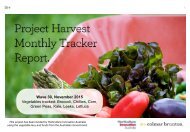vegetables
VA-MayJun2016
VA-MayJun2016
Create successful ePaper yourself
Turn your PDF publications into a flip-book with our unique Google optimized e-Paper software.
R&D<br />
Farm Productivity,<br />
Resource Use<br />
& Management<br />
MINOR USE<br />
AWARENESS<br />
PROGRAM<br />
49<br />
Minor Use Awareness Program: Latest news<br />
THROUGH THE MINOR USE AWARENESS PROGRAM, AUSTRALIAN VEGETABLE GROWERS<br />
CAN BETTER UNDERSTAND THE MODES OF ACTION OF DIFFERENT CHEMICALS TO<br />
REDUCE THE RISK OF PEST RESISTANCE DEVELOPING.<br />
Fungicides, insecticides and<br />
herbicides all have different<br />
chemical structures to target<br />
particular pests. Many years<br />
of investment, research and<br />
effort are required before these<br />
chemicals are approved for<br />
use by growers across Australia<br />
as a means of controlling a<br />
pest issue and minimising the<br />
damage caused by those pests.<br />
While crop protection<br />
companies are committed to<br />
the development and release of<br />
new chemical compounds and<br />
new modes of action, existing<br />
compounds need to have<br />
their effective life extended.<br />
It is important that growers<br />
use chemical control methods<br />
responsibly, to ensure longevity<br />
of the chemistry.<br />
Growers are, effectively, one of<br />
the stewards for the chemicals<br />
they use. They look after the<br />
land, and the chemistries they<br />
use. Resistance management<br />
is a vital concept for this –<br />
understanding the modes of<br />
action for the pesticides that are<br />
used is integral for the future<br />
preservation of the chemistry.<br />
CropLife has created<br />
and distributed guides into<br />
resistance management and<br />
listed the modes of action<br />
for use by industry and<br />
stakeholders. Understanding<br />
and rotating between modes<br />
of action to reduce the risk of<br />
resistance emerging in the pest<br />
population is vital.<br />
When there are<br />
limited options<br />
When available modes of action<br />
to control a pest issue are<br />
i<br />
For more information or to request any of the minor use forms, please<br />
contact AUSVEG Minor Use and Agronomy Coordinator Scott Kwasny on<br />
(03) 9882 0277, email minoruse@ausveg.com.au or visit ausveg.com.<br />
au/minoruse.<br />
The Minor Use Awareness Program has been funded by Horticulture<br />
Innovation Australia Limited using the National Vegetable Levy and funds<br />
from the Australian Government.<br />
Project Number: VG13096<br />
limited, please contact AUSVEG.<br />
The AUSVEG Minor Use and<br />
Agronomy Coordinator can<br />
provide important resources to<br />
assist with your minor use issues.<br />
Alternative options may be<br />
discussed if nothing is currently<br />
available to control a pest issue.<br />
DISPOSE<br />
OF YOUR UNWANTED<br />
AG CHEMICALS<br />
Helping every grower<br />
meet their essential QA<br />
requirements<br />
Free collection for<br />
chemicals displaying the<br />
drumMUSTER eligible<br />
container logo.<br />
To make a booking, visit<br />
the ChemClear website or<br />
call 1800 008 182.<br />
drumMUSTER and ChemClear, operated by Agsafe, are ideally set up to fulfil chemical user requirements<br />
for QA programs such as EnviroVeg and Freshcare. By utilising the services of each initiative, chemical<br />
users are provided with documentation that demonstrate they are meeting their responsibilities for on-farm<br />
waste management of chemicals and used containers. Locate your nearest drumMUSTER collection site<br />
online and share in the responsibility for a sustainable future in Australian agriculture.<br />
drummuster.com.au | chemclear.com.au<br />
27m<br />
and counting








